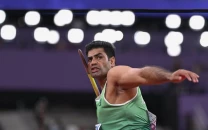'Pakistan Zindabad': Rizwan rallies nation amid rising border tensions
ODI and Multan Sultans captain Mohammad Rizwan expresses firm solidarity with Pakistan amid cross-border tensions.

Pakistan ODI captain and Multan Sultans skipper Mohammad Rizwan has issued a powerful message of unity and resilience amid growing cross-border tensions between India and Pakistan.
Posting from his official Twitter handle (@iMRizwanPak), Rizwan wrote that Pakistan has endured decades of terrorism, and that its people have grown up amid the sound of bullets and blasts. “This land carries the blood of martyrs,” he said, adding that the country still has youth who “love martyrdom the way others love life.”
He added: “We’ve learned from the Holy Quran not to start war — but if one is imposed on us, never retreat.” He closed his message with a call to remain steadfast: “Be brave. Have faith. Do not oppress, and do not accept oppression.” He ended with the hashtags #PeaceForAll and #PakistanZindabad.
The message resonated widely across social platforms, especially as uncertainty looms over the Pakistan Super League (PSL), which faces potential postponement due to security concerns and the wider regional situation.
The PCB and Ministry of Interior are currently holding talks to assess the risk level surrounding upcoming PSL fixtures. Rizwan’s statement, made at a sensitive time, has been received as a morale-boosting voice for national unity and purpose.
Hum ne Allah SWT k pak kalam se yeh seekha hai ke jung mat karo — lekin agar tum par jung thop di jaye, to phir Peeche mat hato.
— Muhammad Rizwan (@iMRizwanPak) May 8, 2025
Pakistan bohot arse se dehshatgardi ka shikar raha hai. Hamari naslain goliyon ki tartarahat aur dhamakon ki goonj sun kar badi hui hain.
Is mitti…
Latest tensions
The latest escalation in tensions between India and Pakistan follows the April 22 attack in Pahalgam, Indian Illegally Occupied Jammu and Kashmir (IIOJK), which resulted in 26 fatalities. India immediately accused Pakistan-based elements of orchestrating the attack, although no evidence was provided. Islamabad has strongly rejected these allegations.
In retaliation, India closed the Wagah land border on April 23, suspended the Indus Waters Treaty, and revoked Pakistani visas. Pakistan responded by labeling any disruption to water flow as an "act of war" and closed the Wagah crossing on its side.
The situation escalated further on Wednesday, as reports from various cities in Pakistan, including Muzaffarabad, Kotli, Muridke, and Bahawalpur, detailed multiple explosions. Pakistan’s military spokesperson, Lt Gen Ahmed Sharif Chaudhry, confirmed that Indian airstrikes had targeted multiple locations within Pakistan. In response, Pakistan launched swift air and ground operations.
Within the first hour of retaliation, Pakistan announced the downing of five Indian fighter jets, including four Rafale aircraft, which India had recently acquired from France to strengthen its air defenses following the failed Balakot operation in 2019.
"Pakistan could have shot down 10 Indian fighter jets," Lt Gen Chaudhry said during a press briefing. "But Pakistan chose to exercise restraint."
Despite the scale of the response, Indian media remained largely silent on the losses. The Hindu, a prominent Indian newspaper, initially reported that three Indian jets had been downed but later removed the article, likely under pressure from the Indian government to avoid further embarrassment.
An American commentator on CNN stated that the potential loss of Rafale jets would severely damage India’s claim to air superiority, which it had built around the induction of these advanced French warplanes. Some experts speculated that the confrontation served as a test of Chinese and Western military technologies, particularly after Pakistan acquired J-10C jets from China in response to India’s Rafale fleet.
A senior French intelligence official confirmed to CNN that one Rafale jet had indeed been shot down by Pakistan, marking the first time that this sophisticated French aircraft had been lost in combat.
In another development, the Pakistan armed forces confirmed the neutralization of 25 Israeli-made Harop drones used by India in recent cross-border activity.
A statement issued by Pakistan's Inter-Services Public Relations (ISPR) on Thursday confirmed that these drones were shot down using both electronic countermeasures (soft-kill techniques) and conventional weaponry (hard-kill systems) after they were detected flying over multiple areas across Pakistan.
The ISPR described the drone incursions as a "desperate and panicked response" by India, which came after Pakistan’s retaliatory operations on May 6 and 7, in which five Indian fighter jets were downed and several military posts were struck.




















COMMENTS
Comments are moderated and generally will be posted if they are on-topic and not abusive.
For more information, please see our Comments FAQ